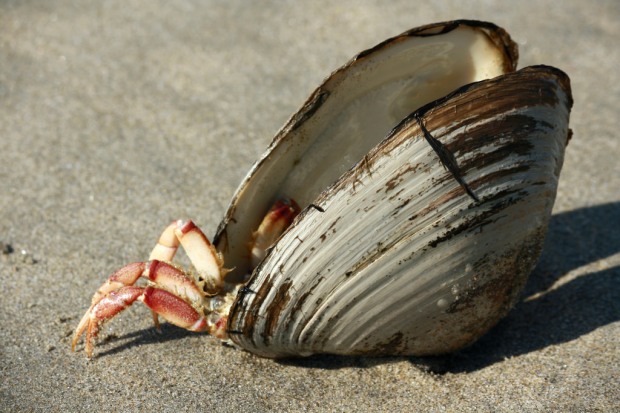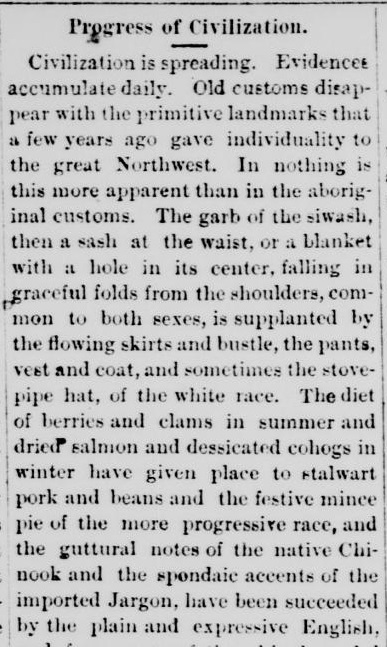Progress of Civilization: a marriage announcement

Progress? (Image credit: Flickr)
Editorial blends with reportage on south Puget Sound, and everyone knows how to take the untranslated Chinuk Wawa.
Among other points of interest for word lovers here:
- “Geoducks” (a local Salish word) were at first widely known by the more familiar East Coast word “quahogs”, usually pronounced “cohogs” or “cohocks”.
- “Chinook” is indiscriminately a word for any Pacific Northwest Native people.
- “Jargon” is perhaps a step up from older tribal languages on an evolutionary ladder toward higher civilization. (!)
Read for yourself, and see what you think.
Progress of Civilization.
Civilization is spreading. Evidences accumulate daily. Old customs disappear with the primitive landmarks that a few years ago gave individuality to ithe great Northwest. In nothing is this more apparent than in the aboriginal customs. The garb of the siwash, then a sash at the waist, or a blanket with a hole in its center, falling in graceful folds from the shoulders, common to both sexes, is supplanted by the flowing skirts and bustle, the pants, vest and coat, and sometimes the stove pipe hat, of the white race. The diet of berries and clams in summer and dried salmon and dessicated cohogs in winter have given place to stalwart pork and beans and the festive mince pie of the more progressive race, and the guttural notes of the native Chinook and the spondaic accents of the imported Jargon, have been succeeded by the plain and expressive English,
and from some of the shingle-roofed tenements which have supplemented the bark wigwams issue, on occasion, as purely cut and properly emphasized profanity as can be uttered by a Republican aspirant when the startling fact that the other fellow has got the nomination first breaks upon his understanding.
All these things indicate remarkable progress, and speak volumes in support of the native adaptability, if not ability, of aboriginal character. Now the social customs of the whites are coming into vogue. The dusky brave no longer buys or steals a wife and marries her by the simple ceremony of taking her into camp, but he brings the dusky maid to town, gets somebody to swear she is over eighteen years of age, pays three dollars for a permit from the County Auditor, and then has the priest or the Probate
Judge to tie the knot in a truly civilized style. This is, of course, an improvement on the old custom, because it is the result of evolution, and progress is always onward and upward.
All this is but preliminary to the announcement that [Chehalis tribal members] Charley Patoie [Petoie] and Emma Heck (Anglicised) were united in marriage by Father Classens, Tuesday, under all the forms of law and rites of the Catholic church. They seemed to follow as closely in the footsteps of their white exemplars as their opportunities for observation enabled them to determine. They have doubtless ere this sent out their cards, held their reception and settled down to outshine some of their neighbors, slight others and imitate the follies and manifest the foibles of “polite sassiety.” Hiu teke quanisum mitlight copa mika. Clahyou!
— from the Olympia (WA) Washington Standard of September 21, 1888, page 2, column 3
The parting sentiment in Chinook Jargon looks like the creation of an actual speaker of that language, with unique spellings not lifted from published guides. It’s not the clearest or most grammatical, though. Here is what I make of it:
Hiu teke quanisum mitlight copa mika. Clahyou!
Háyú tíki kwánsəm míłayt kʰapa máyka. £ax̣áya!
Much love always be with you. Salutations!
‘(May) much love always be with you. Cheers!’
Typically in the Jargon there’s no noun for “love”. And Chinuk Wawa has perfectly good ways to express a wish, which are absent here. So the above may be modeled on English-language sentiments that are conventional to express at a wedding, thus artfully tying up the theme of both congratulating and insulting Indigenous people on their “progress” toward Settler-style life.

